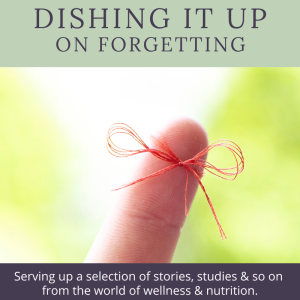
The theme of this month’s Dishing It Up newsletter evolved rather organically. First, as my level of busy-ness and business ramped up, I found I was forgetting to write the newsletter. Then, during a Pilates class, my instructor mentioned something about gluteal amnesia which piqued my interest since my glutes are certainly forgetting they exist. And there have been a few times in recent memory when I was sure I’d added certain items to my grocery delivery order but, it seems, I did not. I’ve either been forgetting things yet again or Fresh City is messing with my head and removing things without telling me.
So this month I thought I’d post a few items on forgetting and how to improve the situation. And I hope that, if and when you have some time this weekend, you’ll remember to read it. 😉
Dishing It Up on Forgetting
- Optimal dose and type of exercise to improve cognitive function in older adults
- Gluteal amnesia, aka ‘dead butt syndrome’
- Sitting all day can cause ‘dead butt syndrome’. These exercises can help.
- The best brain food to start your morning off right
- Your brain needs you to focus on one thing at a time
- Sleep, mental health and memory
Read on for a bite-sized summary and links for each story …
Optimal dose and type of exercise to improve cognitive function in older adults
Before I forget, I thought I’d start with exercise. Whatever you do, do not forget to exercise regularly. It is ultra important to improve your cognitive function, as this study published this month shows. Of particular interest is Table 1. which shows minimum and optimal exercise recommendations to improve cognitive function. Spoiler alert: “Exercise is one of the few interventions shown to prevent and treat dementia or cognitive decline in older adults.” The probability of me exercising is inversely proportional to the number of hours that elapse before I start. So it’s how I start my day and stay consistent.
Read the study …
Gluteal Amnesia (aka ‘dead butt syndrome’)
This term was added to our lexicon by Canadian Stuart McGill, PhD, a ‘distinguished professor emeritus’ at the University of Waterloo, whose primary research focus is in spine biomechanics. He has a creative diagnostic tool. To tell if your butt is “on”, get into a bridge position see if you can hold a playing card (or $10 bill) between your cheeks (not the ones on your face, obviously). ‘Dead butt syndrome’ is another name for it, and this video talks more about what it is and how to resuscitate it.
Listen for more …
Sitting all day can cause ‘dead butt syndrome’. These exercises can help.
For those who were required to work from home during the pandemic, the incidental exercise we got during our commute (even if it was only walking to public transit or the car) disappeared. For some, this was their only exercise. Also gone for a long time was taking kids to school, walking to meetings or up to another floor to see a colleague. Instead, many were glued to computers and teleconferencing for hours at a time. This is a perfect prescription for dead butt syndrome. Once you recall you used to have an a$$ and decide you’d like to see more of it, here’s how to bring it back to life.
Bust a (butt) move …
The best brain food to start your morning off right
Exercise very effectively prevents and treats dementia. But the food you eat has a powerful effect too. These brain-healthy foods will help start your day off right. And for more on feeding your brain, check out my previous post Food for Thought: How Best to Feed Your Brain.
Read more …
Your brain needs you to focus on one thing at a time
“Multitasking, particularly on tasks that require attentiveness, can lead to more errors and mistakes. Additionally, while it seems you’re getting more done while multitasking, you may be taking longer to complete tasks because of constant context switching. It can cause brain shrinkage and short-term memory loss.” One of the key benefits of monotasking is improved retention of information.
Read more …
Sleep, mental health and memory
I will put this newsletter to bed with this article that discusses the link between sleep and memory. I like the section that starts about half way down. “Our mental health is driven by how we remember (and forget) things that happen to us in our everyday lives, and sleep is critical in these processes of the ‘memory’ and the ‘forgettery’.” In particular, the analogy that illustrates how important deep sleep is to memory is, well, memorable.
Read more …
Want to receive Dishing It Up and other blog posts from The Nutritional Reset direct to your inbox?
Join The Nutritional Reset community here to receive each month’s edition of Dishing It Up, as well as exclusive recipes and more, direct to your inbox!